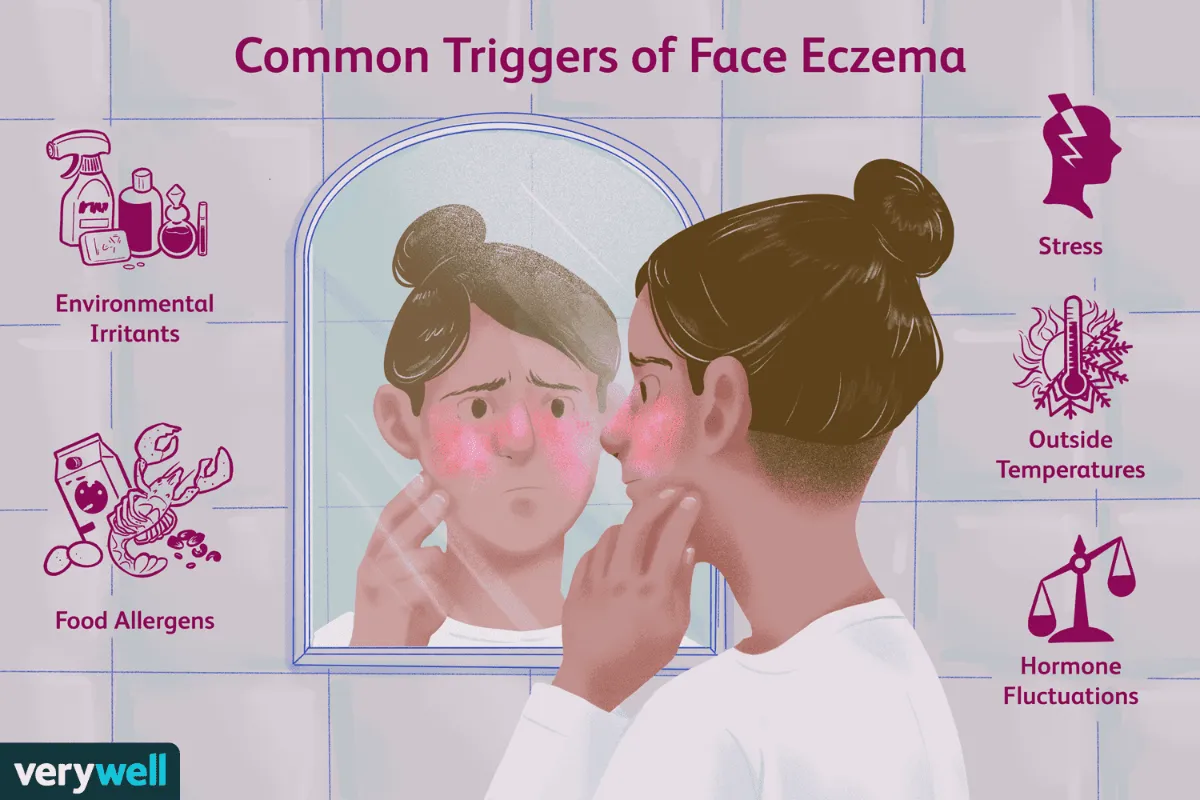Living with eczema can lead to mental health issues like anxiety and depression. Managing your eczema symptoms, working with a mental health professional, and maintaining healthy habits can help improve your well-being.
What is Eczema?
Eczema, also known as atopic dermatitis, is a long-term skin condition that causes dry, itchy, and irritated skin. It often affects visible areas like the face and can lead to pain, skin infections, sleep problems, and eye issues. Eczema and mental health are closely linked: eczema can affect your mental health, and stress or other mental health problems can make eczema worse.
What Causes Eczema Flare-Ups?
Eczema flare-ups happen when something triggers your symptoms. Triggers can be environmental, like certain fabrics, or physical, like stress or hormonal changes. Eczema makes your skin dry and weak, allowing germs, allergens, and irritants to enter more easily. This triggers an immune response, causing inflammation. Stress, for example, can worsen eczema by increasing inflammation in your body.
How Eczema Affects Mental Health
Eczema can harm your mental health. The constant itching and unpredictability of flare-ups can be frustrating and disrupt your sleep. Visible eczema patches may make you feel self-conscious, leading to social isolation and low self-esteem.
A 2023 survey found that 72.6% of people with eczema experienced mental health symptoms for 1-10 days in the past month, and 17.7% had symptoms for 11 days or more. Stress from eczema can lead to anxiety and depression. Research shows that inflammation from eczema can affect brain chemicals like serotonin, increasing the risk of mental health issues.
Adults with eczema are up to three times more likely to have anxiety or depression, and this risk increases as eczema worsens. Children with eczema are also more likely to experience depression, anxiety, or ADHD. Some children as young as 4 may show signs of coping with stress by avoiding or suppressing their feelings.
Signs of Anxiety and Depression
It can be hard to notice early signs of anxiety or depression. Symptoms often develop slowly and may be mistaken for stress or tiredness.
Symptoms of depression include:
- Feeling sad or down
- Irritability
- Loss of interest in hobbies
- Withdrawing from social activities
- Trouble concentrating
- Changes in sleep patterns
- Lack of motivation
- Negative thoughts or self-criticism
- Thoughts about death or wanting to disappear
Symptoms of anxiety include:
- Constant worry
- Overthinking
- Expecting the worst
- Irritability
- Feeling a sense of doom
- Racing thoughts
- Trouble relaxing
- Avoiding situations
- Muscle tension, headaches, or nausea
- Sleep problems
Tips for Managing Mental Health
Depression and anxiety can be treated and managed alongside eczema. Here are some ways to cope:
1. Talk to a Mental Health Professional
Therapists can help you understand the causes of your feelings, teach coping skills, and change unhelpful thoughts or behaviors.
2. Journaling
Writing down your thoughts and feelings can help you process emotions and reduce stress. Studies show journaling is a safe and effective way to manage mental health.
3. Maintain a Healthy Lifestyle
Eating well, exercising, and getting enough sleep can improve your mental health and overall well-being.
4. Manage Eczema
Work with your dermatologist to control your eczema. Fewer symptoms mean less stress and inflammation, which can improve your mental health.
How to Find Help
If eczema is affecting your mental health, your dermatologist can refer you to a mental health professional. You can also find help through:
- The American Psychological Association’s Psychologist Locator
- The American Art Therapy Association’s Art Therapist Locator
- The Association for Behavioral and Cognitive Therapies’ “Find a CBT Therapist” tool
- Mental Health America’s “Find an Affiliate” tool
For immediate support, call the SAMHSA National Helpline at 1-800-662-4357.
Key Takeaways
Eczema is a skin condition that can impact your mental health, increasing the risk of anxiety and depression. At the same time, mental health issues can make eczema worse. Managing eczema, maintaining healthy habits, and seeking therapy can help you feel better both physically and emotionally.

